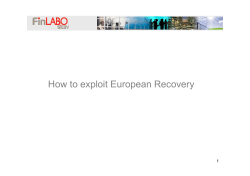
Document 359521
Lucerne, October 16, 2014 ROR To the Investors of the Fund Reichmuth Himalaja Positive Third Quarter 2014 – Reichmuth Himalaja +2.6 +2.6% 2.6% YTD in USD Dear Investors Reichmuth Himalaja, our portfolio focused on Asia, achieved a USD performance of +0.7% in the third quarter of 2014. During the same period the MSCI AC Asia Pacific index lost 2.9%. For the first nine month of this year the Fund and the equity index gained +2.6% and 1.4% respectively. Ever since its launch in 2004 the fund’s annualized USD return amounts to +4.5%. This clearly beats the HFRI Fund of Funds Index which achieved a performance of 3.4% per annum over the same period. In comparison, equity markets as measured by the MSCI AC Asia Pacific, returned +6.9% per annum, yet with a considerably higher volatility. Review Asian equity markets recorded decent price gains until the beginning of September. However, as a result of the strong USD and the contradictory macro data emanating from China, Asian equity markets suffered significant losses during the course of September. Additionally, the political demonstrations in Hong Kong towards the end of the month caused further uncertainty among investors. The performance attribution for the first nine months of 2014 on a portfolio level is as follows: In comparison with the overall market, our Long-only equity specialists, which make up around 50% of the portfolio of Reichmuth Himalaja, achieved strong positive performances this year. This component outperformed the market primarily thanks to Vietnam specialists as well as managers whose main focus was India and South-East Asia. One manager who specializes in Asian REITs achieved also substantial profits for the portfolio. Conversely, specialists who are predominantly invested in undervalued Chinese and South Korean equities expressed still mixed results. The Long/Short specialists also realized slightly positive returns overall. This part of the portfolio has a weighting of roughly 20%. The Global Macro strategies could not contribute positively to portfolio performance. We have reduced this part of the portfolio as the central banks policies continue to cause an extremely challenging environment for the fundamentally oriented Macro managers. The direction of the portfolio has barely changed. Apart from a complete redemption of one Macro fund, we have not carried out any changes in portfolio structure. The prime focus continues to be on valueoriented equity specialists. The number of managers is currently at 35. Attractive Valuations in Asia Since the end of 2010, the Asian equity market, as measured by the MSCI Asia ex Japan, has not recorded any price gains despite a rise in corporate profits over the same period. Consequently, Asian equity markets have become more attractively priced. Whereas corporate profits have risen in the USA, the reverse is true in Europe. In spite of this, equity markets have performed better in Europe than in Asia. Japanese companies have benefitted from the ultra-expansive monetary policy of the Bank of Japan and from the weak Yen. As a result, the equity market has risen sharply, without a corresponding increase in fundamental valuations. Source: Bloomberg, as of 30 Sept 2014, EPS = earnings per share The measures taken by western central banks which led to an increase in the asset values, as well as the transformation of the Chinese economy which resulted in an economic slowdown have given rise to this divergence across the markets. However, we can scarcely see any prospects for growth in the European equity markets with their rich valuations. By contrast, the moderately priced equity markets in Asia offer attractive investment opportunities. The structural growth prospects in Asia remain intact, despite the world economy weakening. The demand of the rapidly increasing middle class in the emerging Asian countries continues to rise unabated. A strong Dollar and rising interest rates in the USA has frequently led to capital outflows from the emerging economies and therefore to economic crises in these countries. However, a comparison to the Asian-crisis in the 1990s is not appropriate because most Asian countries have a low level of indebtedness and solid national budgets. Furthermore, low commodity prices will have a positive effect on Asia as the majority of the countries are net oil-importers. If the past has taught us anything, it is that investors have made money in Asia by profiting from low and attractive valuations. As the old saying goes, “the profit lies in the purchase”. It is difficult to time money flows. Through appropriate diversification, we expect much lower volatility as compared to broader equity markets. We would be delighted to inform you in a personal meeting about the investment opportunities that Reichmuth Himalaja offers. Meanwhile, we thank you very much for the trust that you have placed in us and are available for any queries that you may have. Very truly yours, REICHMUTH & CO INVESTMENTFONDS AG Patrick Erne Rolf Rathmayr Enclosure: Reichmuth Himalaja in a Nutshell
© Copyright 2025




















